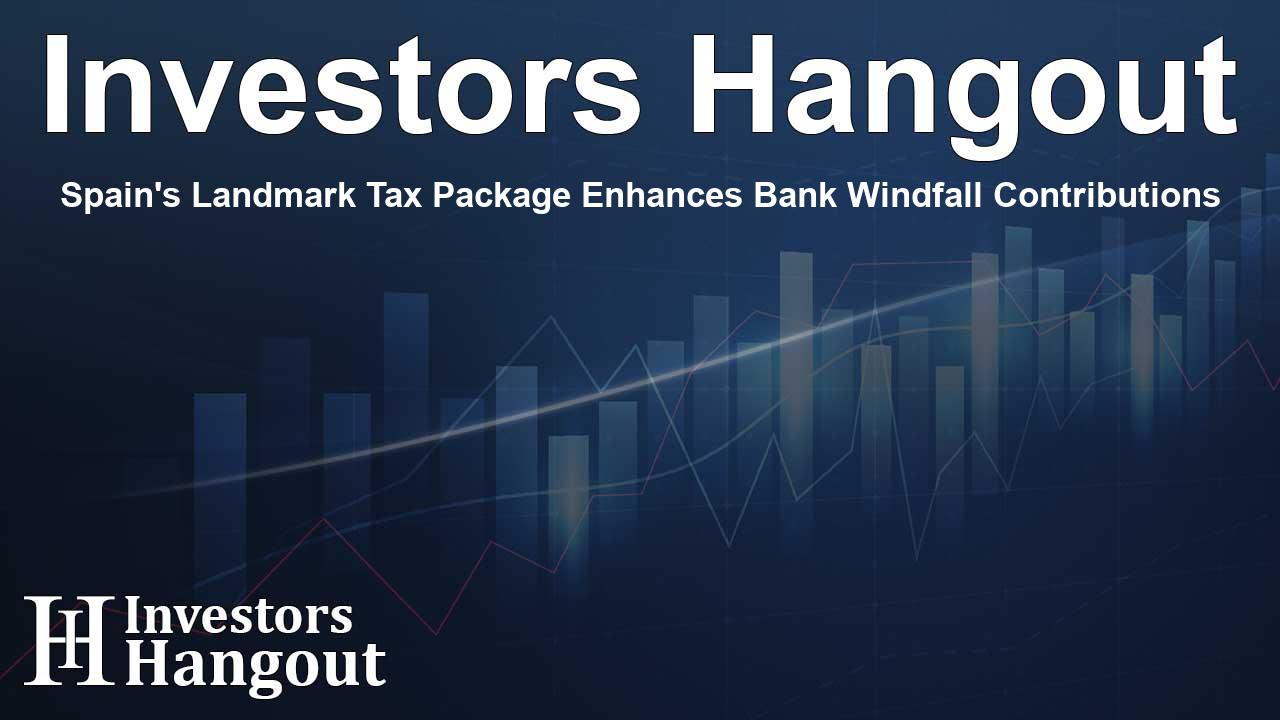Spain's Landmark Tax Package Enhances Bank Windfall Contributions

Spain's Recent Tax Package Approval
Spanish lawmakers have taken a significant step by approving a new tax package that includes an extension of the bank windfall tax for an additional three years. This decision was reached during a last-minute agreement with smaller political parties in the fragmented lower house of parliament.
Details of the Tax Package
The legislation received backing from the Socialist-led government with a close vote of 178 in favor and 171 against it. A key aspect of this package is its requirement for large corporations in Spain, specifically those with annual revenues exceeding 750 million euros, to adhere to a minimum tax rate of 15% on their consolidated profits. This aligns with recent European directives aimed at creating fairer taxation standards across member states.
Impact of European Recovery Funds
Following the passage of the bill, Prime Minister Pedro Sanchez hailed it as "landmark" legislation essential for unlocking the disbursement of European recovery funds, amounting to 7.2 billion euros. This funding is crucial for Spain's economic recovery and development.
The European Commission's Role
Earlier this year, the European Commission initiated legal proceedings against Spain, along with other nations, for not implementing agreed-upon fiscal guidelines to prevent tax dumping by the prescribed deadlines. The current tax package is seen as a necessary step to comply with these EU directives and avoid further legal complications.
Focus on the Banking Sector
One of the primary features of the tax package is the three-year extension of the annual bank windfall tax. This revision follows concessions made by the government to secure support from the Junts party, allowing regional administrations to collect tax revenues. The new structure of this tax will vary between 1% and 7%, depending on lenders' net interest incomes and commissions, which will be determined in relation to their lending income volumes rather than the existing fixed rate of 4.8%.
Tax Rates for Major Lenders
For banks with annual revenues exceeding 5 billion euros, the tax rate will be set at 7%. Major banking institutions like Santander, BBVA, and Caixabank are expected to be significantly impacted by these changes. Banking associations, however, have expressed concerns about the potential legal repercussions and competitiveness issues this tax could foster, signaling their intentions to challenge it in court.
Political Negotiations and Future Changes
The approval process for the tax package was complex and required delicate negotiations. The Socialist party managed to get the necessary backing after promising to work on a permanent windfall tax targeting energy companies, a commitment that was previously sidelined. Podemos, a key player in these discussions, has vowed to advocate for a robust version of this tax, underscoring the need for ambitious taxation policies.
Concerns from the Energy Sector
Meanwhile, the extension of taxes impacting the energy sector has raised alarms. Utility companies are cautioning that prolonging such taxes could jeopardize approximately 30 billion euros in renewable energy investments. These financial stakes reflect the ongoing tensions between policy initiatives aimed at increasing government revenue and the economic growth potential of Spain’s renewable energy sector.
Conclusion
This newly approved tax package in Spain not only represents a crucial strategy to enhance government revenues but also reflects a broader commitment to fiscal responsibility within the framework of European regulations. As the country continues to navigate its complex political landscape, these measures will play a vital role in shaping its economic future.
Frequently Asked Questions
What is the significance of the new tax package in Spain?
The tax package extends the bank windfall tax and ensures large companies pay a minimum tax, supporting compliance with EU directives and access to recovery funds.
Who will be affected by the new bank windfall tax?
Major banks with annual revenues exceeding 5 billion euros, such as Santander and BBVA, will be significantly affected by the new tax rates.
What are the expected outcomes of the tax package?
The package aims to enhance government revenue and facilitate the disbursement of European recovery funds essential for economic recovery.
How will regional administrations be involved in the tax collection?
The agreement allows regional administrations to collect the revenues from the bank windfall tax, emphasizing a decentralized approach to tax management.
What concerns have been raised by banking associations regarding the tax?
Banking associations like AEB and CECA have expressed worries about legal uncertainties and potential negative impacts on competitiveness due to the new tax structure.
About Investors Hangout
Investors Hangout is a leading online stock forum for financial discussion and learning, offering a wide range of free tools and resources. It draws in traders of all levels, who exchange market knowledge, investigate trading tactics, and keep an eye on industry developments in real time. Featuring financial articles, stock message boards, quotes, charts, company profiles, and live news updates. Through cooperative learning and a wealth of informational resources, it helps users from novices creating their first portfolios to experts honing their techniques. Join Investors Hangout today: https://investorshangout.com/
Disclaimer: The content of this article is solely for general informational purposes only; it does not represent legal, financial, or investment advice. Investors Hangout does not offer financial advice; the author is not a licensed financial advisor. Consult a qualified advisor before making any financial or investment decisions based on this article. The author's interpretation of publicly available data shapes the opinions presented here; as a result, they should not be taken as advice to purchase, sell, or hold any securities mentioned or any other investments. The author does not guarantee the accuracy, completeness, or timeliness of any material, providing it "as is." Information and market conditions may change; past performance is not indicative of future outcomes. If any of the material offered here is inaccurate, please contact us for corrections.